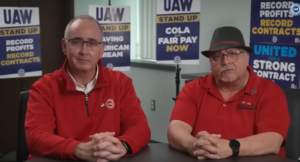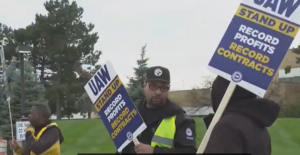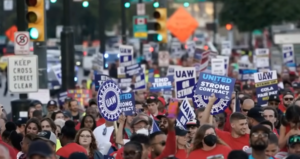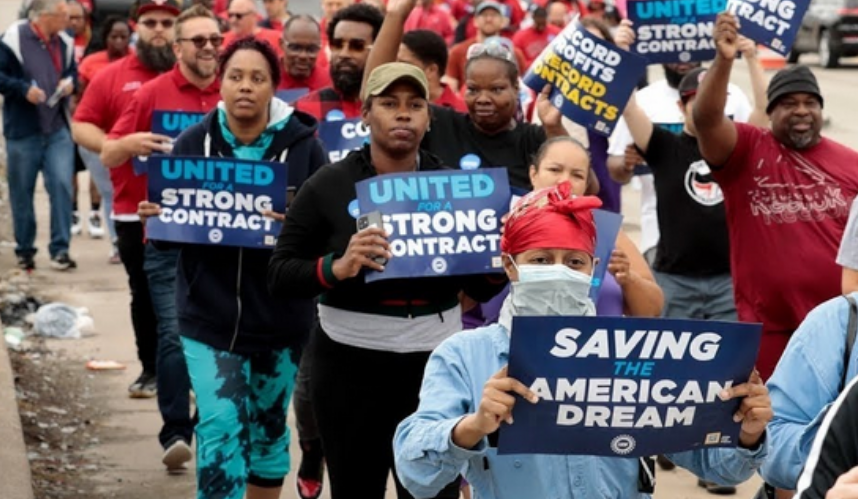By Andrew Moss
Photos: YouTube Screenshots
American workers made great strides in 2023. Autoworkers, UPS drivers, Kaiser health workers, screenwriters, and actors all scored significant gains in earnings and benefits as a result of their respective unions taking tough, assertive stances in strikes and other forms of workplace activism. The agreements emerging from these actions will mean substantial improvements in the lives of hundreds of thousands of workers and their families.

But daunting obstacles face millions of other workers who’ve been attempting to unionize their workplaces or simply secure a fair and just contract when a previous contract expired. Global companies like Starbucks and Amazon, for example, have managed to avoid any kind of contract settlement with unionizing employees, and in my home city of Los Angeles, where existing contracts expired on June 30 for over 60 hotels, the largest hotel worker strike in U.S. history continues to drag on, soon into its sixth month. Only five hotels thus far have come to any tentative agreements with workers.
A major problem, particularly for workers seeking to unionize their workplaces for the first time, is that U.S. labor law places workers at a serious disadvantage with respect to employers. The latter can, for example, subject employees to “captive audience” meetings that promulgate anti-union messages, and can indefinitely drag out collective bargaining with virtually no penalties – a process that can simply wear workers down by attrition.
In a broader sense, however, the U.S. – unlike many advanced industrialized countries – is pervaded in its political culture and institutions by a deep anti-union ideology. Extending in the modern era as far back as passage of the 1935 National Labor Relations Act (Wagner Act), this ideology has guided a wide range of efforts to unravel the New Deal endorsement of government as a regulator of corporate power and as a protector of workers’ rights to organize and bargain collectively.
As early as the 1940’s, business groups and conservative politicians advanced “right-to-work” legislation and litigation undermining unions by preventing them from requiring membership or dues from workers at sites where the unions represented all workers in collective bargaining. These legislative and judicial efforts portrayed right-to-work as a defense of workers’ rights and as a counter to union racketeering and corruption. Since then, 26 states have adopted right-to-work legislation.
In addition, union busting emerged as a sophisticated way of countering union influence. Labor historian Nelson Lichtenstein documented how an attorney and Wal-Mart executive vice-president named John Tate helped perfect, from the early 1970’s on, a highly effective strategy that fended off the most assertive efforts to unionize that retail giant’s stores. As Tate declared in 2004 to a meeting of assembled Wal-Mart executives and managers, “Labor unions are nothing but blood-sucking parasites living off the productive labor of people who work for a living.” Noting that unions represented a third of all workers in the private sector fifty years earlier, he said, “I am part of the reason that today they represent nine percent.”

Since Mr. Tate uttered those words, the public approval of unions has shifted significantly upward in the wake of a major recession, an ever-widening inequality, and a devastating pandemic. In these altered circumstances, therefore, it’s instructive to read a recent Harvard Business Review (HBR) article entitled “The Labor-Savvy Leader,” in which three management experts associated with the Aspen Institute and MIT’s Sloan School of Management advise corporate leaders to work with, rather than against, organized labor.
These experts (Roy E. Bahat, Thomas A. Kochan, and Liba Wenig Rubenstein) argue that companies choosing greater collaboration with labor can reap such benefits as improved employee satisfaction and retention, while companies seeking to bust unions can expose themselves to “existential risks,” including harm to their corporate brands, i.e. as consumers become more aware of companies’ treatment of workers.
This advice to corporate leaders is well-taken, but anti-union ideology is so pervasive that it will take a lot more than savvy corporate leaders to change the culture. The HBR authors may write that union busting poses an existential risk to companies that practice it, but a glance at the boiler plate language of corporate annual reports will find that unions themselves are often perceived by management as the existential risk. Marriott International, for example, the largest hotel chain in the world, tells stockholders in its most recent report that labor disputes and increased demands from labor unions could, among other things, “harm our relationship with our associates [employees], harm our relationships with our guests and customers, divert management attention, and reduce customer demand for our services.”
For the striking LA hotel workers I’ve come to know, these “increased demands” are for contracts that ensure meaningful levels of economic stability and security. In this regard, the workers are striking on behalf of the union idea, a concept that, by and large, informs all struggles for economic justice. Uniting the values of solidarity and social freedom, this idea affirms that all working people, no matter what their background or educational status, have the right to lives of dignity and well-being.
The struggle for this idea, for the values of solidarity and social freedom, plays out on the picket line – and also in courtrooms, legislative chambers, op-ed pages, think tanks, educational institutions, and places of worship. For the hotel workers I know, the union idea translates into the right to enough compensation that one needn’t sleep in one’s car or work or two or three jobs to make ends meet. It means having time and resources enough to care for an elderly parent or a disabled family member, time and resources enough to be with one’s children and see them grow.
At the individual, human level, this is what’s at stake in the struggle for the union idea today.

Andrew Moss, syndicated by PeaceVoice, writes on labor and immigration from Los Angeles. He is an emeritus professor (Nonviolence Studies, English) from the California State University.






